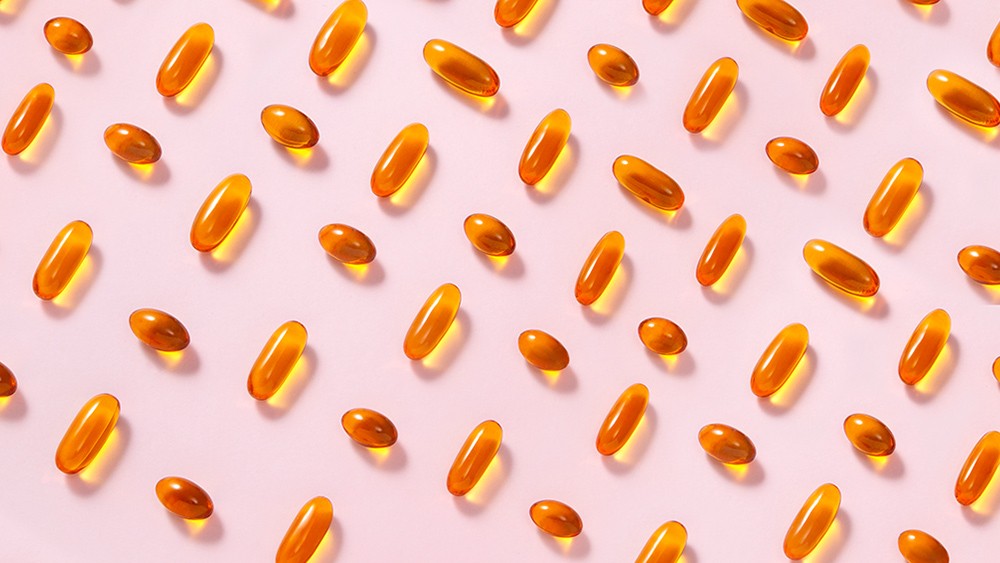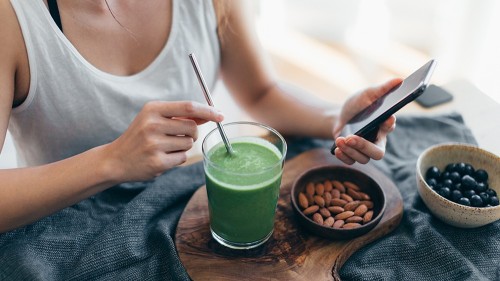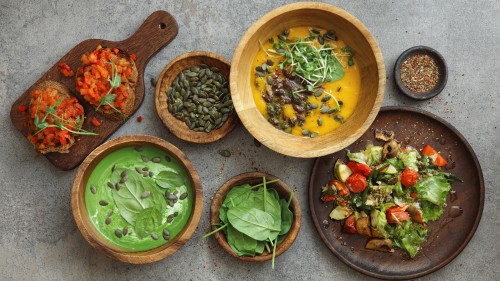9 Supplements to Take on a Vegan Diet, According to a Dietitian
Last Updated on February 10, 2024
Medically Reviewed by Anthony Dugarte, MD
In this article, we share the top 9 supplements to consider when following a vegan diet to prevent nutritional deficiencies.


Key Highlights
- A vegan diet can be healthy but requires diligent planning and likely supplementation to prevent deficiencies in critical nutrients.
- Key supplements recommended include vitamin B12, omega-3s, vitamin D3, calcium, and iron. Dosages vary based on age, gender, and pregnancy status.
- It's important to choose plant-based/vegan supplement sources for optimal absorption, such as Omega-3 from algae.
- Regular bloodwork and doctor/dietitian guidance should guide individualized supplementation plans and help monitor for deficiencies.
- A balanced whole-food plant-based diet and strategic supplementation are ideal for meeting nutrient needs on a vegan diet.
A Word on Vegan Diet
A vegan diet is defined as a diet free of animal products, including meat, poultry, fish, eggs, dairy products, gelatin, and, in some cases, even free of honey.
More of the population is starting to follow plant-based diets than ever before, with many people choosing to be vegan.
There are myriad reasons why people choose to follow a vegan diet and may also pursue a vegan lifestyle, avoiding animal products.
For some, veganism is preferred because of its potentially lower environmental impact compared to an omnivorous diet. (1) Others may follow a vegan diet due to their religious beliefs, concerns about animal welfare, or health and weight loss.
Vegan diets are associated with various health benefits, including a reduced risk for metabolic syndrome and improved gut microbiota, when the diet is well-balanced. (2, 3)
So-called “junk food vegans” may be at risk of nutrient deficiencies due to frequent consumption of empty calories from processed foods.
Even with the best planning for a nutrient-dense vegan diet, there are some vitamins and minerals vegans may lack due to the primary sources being from animal products. (4)
Taking certain supplements can help prevent nutrient deficiencies and help you optimize your vegan diet.
Here are some supplements vegans should take while following a vegan diet:
1. Vitamin B12
The first supplement that comes to mind as necessary for a vegan diet is vitamin B12.
Vitamin B12 is an essential water-soluble vitamin necessary for energy production, DNA synthesis, and nerve health. (5)
Deficiencies may result in neurological damage, anemia, increased risk for cardiovascular disease, and osteoporosis.
How Much Vitamin B12 Should I Take?
- Men 18+ years: 2.4 mcg/day
- Women 18+ years: mcg/day
- Pregnancy: 2.6 mcg/day
- Lactation: 2.8 mcg/day
Vitamin B12 primarily comes from animal products but can be found in a few plant-based sources. (6)
Examples include fortified cereals, nutritional yeast, fermented foods, and seaweed.
Intake from these sources can be inconsistent, which is why health professionals recommend that vegans take a vitamin B12 supplement to prevent the risk of deficiency.
Vitamin B12 supplements for vegans are often found as either cyanocobalamin or methylcobalamin, both of which can be good options. The best form for you may depend on your gene expression (MTHFR) or existing vitamin B12 deficiency. Your doctor can check you for this mutation.
- Cyanocobalamin is the synthetic form of vitamin B12 that has to be converted in the body to its active form but is often used in supplements because of its stability.
- Methylcobalamin is a naturally occurring and active form of B12. It may be better absorbed by individuals with an MTHFR mutation (which makes it difficult to convert B12 into its active form) or an existing vitamin B12 deficiency. (7, 8)
2. Calcium
Vegans are at risk of calcium deficiency and may have the lowest dietary intake of calcium compared to individuals following other plant-based or omnivorous diets. (9)
Calcium is the most abundant mineral in the body, with 99% making up the bones and teeth and 1% circulating through the blood and tissues.
Calcium is necessary for muscle function, normal hormone functioning, cardiovascular health, and signaling in the nervous system.
How Much Calcium Should I Take?
- Men and Women 18 years: 1,300 mg/day
- Men 19–70 years: 1,000 mg/day
- Women 19–50 years: 1,000 mg/day
- Women 50–70 years: 1,200 mg/day
- Men and Women 70+ years: 1,200 mg/day
- Pregnancy: 1,000 mg/day
- Lactation: 1,000 mg/day
Vegan sources of calcium include cruciferous vegetables (e.g., broccoli, Brussels sprouts, and cabbage), leafy greens (e.g., Bok choy, spinach, and turnip greens), beans, peas, lentils, almonds, seeds, and amaranth.
Many of these sources contain oxalates, which make it difficult for your body to absorb all of the calcium from them. (10)
Fortified sources such as fruit juices, breakfast cereals, plant-based milks, and tofu can help vegans meet their calcium needs.
There are different types of calcium supplements for vegans out on the market, but research is inconsistent in showing differences in the absorption of various forms of calcium. (11)
To get the most from your calcium supplement, take it with or after your meal because the stomach acid helps increase its absorption.
3. Omega-3
Omega-3 fatty acids are a group of essential fatty acids that our bodies cannot make in sufficient amounts on their own, requiring us to obtain them from our diet.
Omega-3 fatty acids are beneficial for heart health, brain function, gut health, immune function, eye health, mental health, normal hormone functioning, reducing inflammation, and healthy pregnancy and lactation.
The primary omega-3 fatty acids in our diet are alpha-linoleic acid (ALA), docosahexaenoic acid (DHA), and eicosapentaenoic acid (EPA).
ALA can be converted to DHA and EPA, but the conversion rate is very low and competes with omega-6 fatty acids. (12)
How Much Omega-3 Should I Take?
- Men 18+ years: 1.6 g/day
- Women 18+ years: 1.1g/day
- Pregnancy: 1.4 g/day
- Lactation: 1.3 g/day
There is no recommended dietary allowance for EPA + DHA, but the Dietary Guidelines for Americans 2020–2025 recommends an intake of approximately 250 mg of DHA EPA, based on their seafood recommendations. (13)
Vegan sources of omega-3 fatty acids mostly contain ALA and include different plant-based oils, chia and hemp seeds, walnuts, kidney beans, and edamame. The only vegan source of EPA+DHA is algae.
When you’re looking for an omega-3 supplement containing EPA+DHA, make sure that they are algae-based supplements.
ALA supplements also exist and are usually sourced from flaxseed, chia, or hemp seed.
If you want to optimize how much you absorb from your omega-3 supplement, take it with a meal containing dietary fats like avocadoes, nut butters, or olive oil.
4. Vitamin D
Vitamin D is a fat-soluble vitamin that acts like a hormone within the body. (14)
It is needed for bone health, supporting the gut barrier, regulating calcium, and supporting a healthy immune function.
Vitamin D has additional roles in weight management, reducing cardiovascular risk, managing blood sugar, and supporting mood and cognitive function.
How Much Vitamin D Should I Take?
- Men and Women 19–70 years: 15 mcg/day (600 IU)
- Men and Women 70+ years: 20 mcg/day (800 IU)
- Pregnancy and Lactation: does not differ from recommendations for ages 19–70 years
The most accessible vegan source of vitamin D is sunlight, due to UVB rays making it possible for your skin to produce vitamin D3. (15)
Unfortunately, conversion rates can be lowered by factors such as age, use of sunscreen and protective clothing, geographic latitude, and amount of melanin in the skin.
Because of these factors and inadequate dietary vitamin D intake, approximately 40% of U.S. adults have a deficiency, with a disproportionate number of non-Hispanic African Americans at risk for deficiency. (16)
Vitamin D supplements are available as ergocalciferol (vitamin D2) and cholecalciferol (vitamin D3).
Vitamin D2 is the form of vitamin D found naturally in plants, while animals typically produce cholecalciferol (vitamin D3).
Cholecalciferol (vitamin D3) is better at treating Vitamin D deficiency than ergocalciferol (vitamin D2), so you may want to choose a vitamin D3 supplement for your vegan diet. (17)
Not all vitamin D supplements are vegan-friendly – some are made from sheep’s wool!
Look for vegan vitamin D3 supplements sourced from lichen or contain standardized lichen extracts like Vitashine or Vitamin D3V.
5. Iron
Iron is an essential mineral necessary for healthy red blood cells and oxygen transport, muscle metabolism, brain and neurological development, healthy cell function, and hormone synthesis. (18)
How Much Iron Should I Take?
- Men 18 years: 11 mg/day
- Women 18 years: 15 mg/day
- Men 19+ years: 8 mg/day
- Women 19–50 years: 18 mg/day
- Men and Women 51+ years: 8 mg/day
- Pregnancy: 27 mg/day
- Lactation: 10 mg/day (18 years), 9 mg/day (19+)
Women 51+ who have not gone through menopause may have iron needs higher than what’s listed in the RDA.
Plant-based foods contain non-heme iron, which has a lower absorption rate than heme iron, primarily found in red meat and animal products.
Vegan sources of non-heme iron include beans, tofu, nuts, chocolate, lentils, spinach, and other vegetables. In addition, foods like cereals, rice, bread, and other baked goods may be fortified with iron.
Iron supplements for vegans come in many forms, including ferrous sulfate, ferrous gluconate, and ferrous fumarate.
Studies show that there may not be a significant difference in absorption between ferrous fumarate and ferrous sulfate. Still, these forms are slightly more bioavailable than ferrous gluconate or other amino acid chelates. (19)
Research suggests that taking single-dose iron supplements on alternating days may improve iron supplement absorption compared to daily supplementation. (20)
Optimize your iron intake by taking your iron supplement on an empty stomach, and avoid eating iron-rich foods with coffee, tea, or red wine.
If tolerated, take your iron supplement on an empty stomach to maximize absorption.
6. Iodine
Iodine is a trace mineral essential for the formation of thyroid hormones, metabolism regulation, and the development of the skeleton and nervous system in fetuses and infants. (21)
A 2020 review on dietary restrictions and iodine intake found that vegans and vegetarians have an increased risk of iodine deficiency compared to omnivores. (22)
Vegans may need iodine supplements, especially if they’re not using iodized salt or seaweed in their diet.
Vegan sources of iodine include iodized salt, various types of seaweed (e.g., nori, kelp), and some commercially-produced bread.
Supplements for iodine have high bioavailability and may be marketed as potassium iodide, sodium iodide, or kelp supplements. (23)
How Much Iodone Should I Take?
- Men and Women 18+ years: 150 mcg/day
- Pregnancy: 220 mcg/day
- Lactation: 290 mcg/day
7. Zinc
Zinc is a mineral essential for gene expression, enzyme activity, cell growth and development, immune function, and neurological function. (24)
Most sources of zinc contain phytates, which limit how much your body can absorb. Moderately dosed zinc picolinate supplements can help you meet your zinc needs without increasing the risk of copper deficiency. (24)
In addition, other older studies also suggest that zinc picolinate may be the most absorbable form of zinc, but zinc citrate and zinc gluconate are still acceptable forms for vegans. (25)
Vegan sources of zinc include beans, nuts, pumpkin seeds, oatmeal, fortified breakfast cereals, and dairy products.
When taking a zinc supplement, opt for moderate dosing. Prolonged high-dose zinc intake (at or exceeding 50 mg/day) may increase the risk for copper deficiency. (26)
How Much Zinc Should I Take?
- Women 18 years: 9 mg/day
- Men 19+ years: 11 mg/day
- Women 19+ years: 8 mg/day
- Pregnancy: 12 mg/day (18 years), 11 mg (19+ years)
- Lactation: 13 mg/day (18 years), 12 mg/day (19+ years)
8. Vitamin K2
Vitamin K is a family of fat-soluble vitamins that play a role in blood clotting, cardiovascular health, calcium metabolism, bone health, and skeletal remodeling. (27)
If you’re not getting a lot of leafy greens in your vegan diet, healthy gut microbiota and vitamin K2 supplements can help you meet your vitamin K2 goals.
That’s because gut bacteria also produce vitamin K2, so maintaining a healthy gut can be beneficial to maintaining healthy levels of this vitamin.
Studies suggest that vitamin K2 may be better for supplementation because it has a more efficient absorption in the body when compared to vitamin K1, (28)
Two main types of vitamin K are phylloquinone (vitamin K1) and menaquinones (Vitamin K2).
Vegan sources of vitamin K include natto (a fermented soybean dish), leafy greens, broccoli, soybeans, pumpkin, and some fruits (e.g., blueberries, grapes, dried figs).
How Much Vitamin K2 Do I Need?
- Men and Women 18 years: 75 mcg/day
- Men 19+ years: 120 mcg/day
- Women 19+ years: 90 mcg/day
- Pregnancy: 75 mcg/day (18 years), 90 mcg/day (19+ years)
- Lactation: 75 mcg/day (18 years), 90 mcg/day (19+ years)
9. Selenium
Selenium is a trace element that our body uses for the metabolism of thyroid hormones, DNA synthesis, reproduction, immune function, protection against oxidative stress, and even cancer prevention. (29)
The need for selenium supplementation may depend on your geographical location. You may benefit from a selenomethionine supplement if you live in an area and eat vegetables grown in low-selenium soil.
In other words, selenium deficiency may be a concern in areas where the soil is low in selenium. (30)
Vegan sources of selenium include Brazil nuts, brown rice, bread, cereal, pasta, lentils, oatmeal, and other grains.
Selenium supplements are available as selenomethionine, selenium-enriched yeast, sodium selenite, or sodium selenate.
One study found that selenium in the form of selenomethionine had the greatest bioavailability compared to other forms of selenium. (31)
How Much Selenium Do I Need?
- Men and Women 18+ years: 55 mcg/day
- Pregnancy: 60 mcg/day
- Lactation: 70 mcg/day
The Bottom Line
The first step to successfully following a vegan diet is knowledge; now you know what supplements you may need.
Following a vegan diet means planning your diet carefully to ensure you are getting all of the necessary micronutrients and balancing your diet to provide enough protein, healthy fats, and complex carbohydrates.
When looking for a new supplement to support your vegan diet, choose third-party tested supplements that provide individual vitamins in reasonable doses.
Megadoses of vitamins can increase the risk of having excessive vitamin intake and adverse side effects. (32)
Before starting any new supplement, speak with your doctor first to be sure that you can take them safely.
Final Word from an RD
A vegan diet does not have to feel restrictive – many international cuisines are rich in vegan-friendly foods, and modern recipe books have tips to show you how to veganize your favorite foods.
If you’re new to veganism, this beginner’s guide can help you set a strong foundation for a healthy vegan diet.
A registered dietitian can help with additional planning for a vegan diet, and many dietitians specialize in plant-based nutrition and can make this journey easier.
While following a vegan diet, I also recommend getting lab work done so that you can monitor any potential nutrient deficiencies and have your doctor help adjust the dosage of any vitamins.
At WellnessVerge, we only use reputable sources, including peer-reviewed medical journals and well-respected academic institutions.
- Environmental impact of omnivorous, ovo-lacto-vegetarian, and vegan diet:
https://pubmed.ncbi.nlm.nih.gov/28733610/ - Vegan Diet Health Benefits in Metabolic Syndrome:
https://pubmed.ncbi.nlm.nih.gov/33801269/ - Nutritional Status and the Influence of the Vegan Diet on the Gut Microbiota and Human Health:
https://pubmed.ncbi.nlm.nih.gov/32098430/ - Intake and adequacy of the vegan diet. A systematic review of the evidence:
https://pubmed.ncbi.nlm.nih.gov/33341313/ - Vitamin B12 in Health and Disease:
https://www.ncbi.nlm.nih.gov/pmc/articles/PMC3257642/ - Vitamin B12-Containing Plant Food Sources for Vegetarians:
https://www.ncbi.nlm.nih.gov/pmc/articles/PMC4042564/ - Methylenetetrahydrofolate reductase (MTHFR) C677T polymorphism: epidemiology, metabolism and the associated diseases:
https://pubmed.ncbi.nlm.nih.gov/25449138/ - Treatment of vitamin B12 deficiency-methylcobalamine? Cyancobalamine? Hydroxocobalamin?-clearing the confusion:
https://pubmed.ncbi.nlm.nih.gov/25117994/ - Comparison of nutritional quality of the vegan, vegetarian, semi-vegetarian, pesco-vegetarian and omnivorous diet:
https://pubmed.ncbi.nlm.nih.gov/24667136/ - Oxalate: effect on calcium absorbability:
https://pubmed.ncbi.nlm.nih.gov/2801588/ - Calcium revisited: part II calcium supplements and their effects:
https://www.ncbi.nlm.nih.gov/pmc/articles/PMC4189255/ - Past and Present Insights on Alpha-linolenic Acid and the Omega-3 Fatty Acid Family:
https://pubmed.ncbi.nlm.nih.gov/25774650/ - Dietary Guidelines for Americans 2020-2025:
https://www.dietaryguidelines.gov/ - Immunomodulatory Role of Vitamin D: A Review:
https://pubmed.ncbi.nlm.nih.gov/30143987/ - Vitamin D: deficiency, sufficiency and toxicity:
https://pubmed.ncbi.nlm.nih.gov/24067388/ - Prevalence of Vitamin D Deficiency and Associated Risk Factors in the US Population (2011-2012):
https://www.ncbi.nlm.nih.gov/pmc/articles/PMC6075634/ - Comparison of vitamin D2 and vitamin D3 supplementation in raising serum 25-hydroxyvitamin D status: a systematic review and meta-analysis1,2,3:
https://www.ncbi.nlm.nih.gov/pmc/articles/PMC3349454/ - Overview of iron metabolism in health and disease:
https://pubmed.ncbi.nlm.nih.gov/28296010/ - Oral iron supplementation in iron-deficient women: How much and how often?:
https://www.sciencedirect.com/science/article/pii/S0098299720300364 - Iron deficiency:
http://pubmed.ncbi.nlm.nih.gov/30401704/ - Iodine deficiency: Clinical implications:
https://pubmed.ncbi.nlm.nih.gov/28322679/ - Vegans, Vegetarians, and Omnivores: How Does Dietary Choice Influence Iodine Intake? A Systematic Review:
https://pubmed.ncbi.nlm.nih.gov/32486114/ - Bioavailability of seaweed iodine in human beings:
https://pubmed.ncbi.nlm.nih.gov/12146713/ - A Guide to Human Zinc Absorption: General Overview and Recent Advances of In Vitro Intestinal Models:
https://www.ncbi.nlm.nih.gov/pmc/articles/PMC7146416/ - Zinc picolinate: Absorption and supplementation:
https://www.researchgate.net/publication/286596250_Zinc_picolinate_Absorption_and_supplementation - The risk of copper deficiency in patients prescribed zinc supplements:
https://pubmed.ncbi.nlm.nih.gov/26085547/ - Proper Calcium Use: Vitamin K2 as a Promoter of Bone and Cardiovascular Health:
https://www.ncbi.nlm.nih.gov/pmc/articles/PMC4566462/ - Vitamin K as a Diet Supplement with Impact in Human Health: Current Evidence in Age-Related Diseases:
https://www.ncbi.nlm.nih.gov/pmc/articles/PMC7019739/ - Selenium in the environment, metabolism and involvement in body functions:
https://pubmed.ncbi.nlm.nih.gov/23486107/ - Low Intakes of Iodine and Selenium Amongst Vegan and Vegetarian Women Highlight a Potential Nutritional Vulnerability:
https://www.ncbi.nlm.nih.gov/pmc/articles/PMC7251157/ - Effects of chemical form of selenium on plasma biomarkers in a high-dose human supplementation trial:
https://pubmed.ncbi.nlm.nih.gov/16614127/ - Multivitamin-multimineral supplements' effect on total nutrient intake:
https://academic.oup.com/ajcn/article/85/1/280S/4649465






